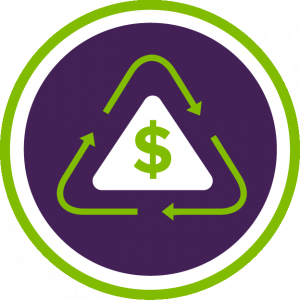The Problem with Landfills
There's No Such Things As "Away"
Although we may not see our trash again after we throw it away, the impacts of our waste are long-lasting. When waste, particularly organic waste, decomposes in a landfill, it produces methane, a greenhouse gas that is more potent and stays in the atmosphere longer than carbon dioxide. Landfills can also pose risks to human health and air quality.
Reducing the amount of waste that we produce while reusing materials and increasing recycling will offer new opportunities to both reduce emissions and diversify our economy.
Reimagined Economy
Increasing Our Diversion Rate
To reach our 2050 goal, we will work hard to build on the progress already has made by expanding existing reuse and recycling programs. Toggle between the years 2019 and 2050 on the chart below to visualize what it will take to get to near-zero waste!
Did you know? The national average household diversion rate is 32.1%.
2019
Diversion Rate = 20%
2019
Trash Rate = 80%
Leading by Example
Reduce, Reuse, Recycle
Leading by Example
Preventing Food Waste
Smart Solutions for a Circular Economy
Explore the goals, strategies, and actions in the All-In Community Plan. Use the dropdown table to see the progress we've made towards implementing each action!
| Action | Description | Status |
1.1.A | Identify opportunities and create local legislation to replace single use plastics and polystyrene. | |
1.1.B | Support the growth of zero-waste and refill shops and incentivize businesses to offer consumer goods without individual packaging. | |
1.1.C | Develop Zero-Waste Toolkits for Residents and Small Businesses. |
| Action | Description | Status |
1.2.A | Secure funding to build an anaerobic digester. | |
1.2.B | Implement a County-wide curbside pick-up program for organic material and food waste. | |
1.2.C | Expand food diversion programs in coordination with the resort corridor, convention center, and other food industry sources. | |
1.2.D | Create a Sustainable Materials Management task force to assess opportunities to reduce waste from construction, major renovations, and demolition projects. |
| Action | Description | Status |
2.1.A | Build partnerships with existing Green Business Programs that provide education, training, financial and technical assistance. |
| Action | Description | Status |
2.2.A | Establish incentives to build a sustainable technology industry, such as solar manufacturing, solar process heat, and battery recycling. | |
2.2.A | Create a Sustainable Innovation Incubator focused on recruiting and growing businesses that drive innovative climate solutions. | |
2.2.A | Design and promote a travel offset program for tourists and conventions to fund local sustainability programs. |
| Action | Description | Status |
3.1.A | Partner with trade unions to provide worker incentives and host trainings on skills needed for an innovation economy. |
Are You All In?
Get Smart About Waste
There are many ways to reduce your waste in a responsible way. Learn more!


